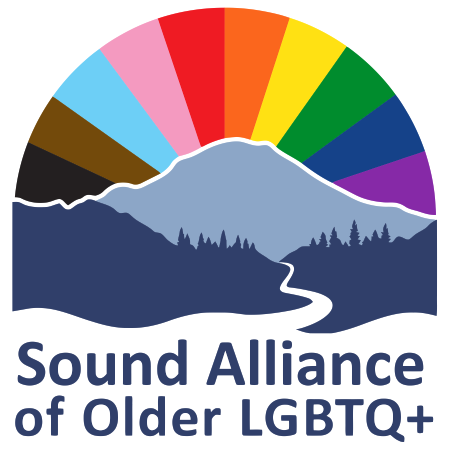We believe that there is a growing number of LGBT elders living in a variety of Thurston County Senior Housing; from senior apartments to assisted living facilities, to nursing homes.
Sound Alliance of Older LGBTQ presents the following resources for incoming GLBT elders who are seeking housing options in the greater Olympia area. Be advised there are a wide range of housing providers, many of which have GLBT residents and some of whom have GLBT staff. While it is against the law to discriminate against GLBT people in Washington State, few housing providers actively market their housing as GLBT-friendly. The following is a representative (but not all-inclusive) list of housing or aging-in-place providers.
Boardwalk Apartments is a subsidized senior apartment complex located in Downtown Olympia near the Farmers Market and Percival Landing. Good access to public transportation and walking distance to downtown. From the beginning, the Boardwalk has had GLBT residents. For more information: www.housing4seniors.com
Panorama City is the largest local Continuing Care Retirement Community, aka “CCRC”, which is located on College Road SE in Lacey (adjacent to Olympia) Panorama City offers a broad range of housing options, (ranges from independent rentals and owner-occupied homes; assisted living; and, skilled nursing facility) and activities situated in a walkable campus setting. Panorama City has always had GLBT residents, many of whom are active on various resident committees. For more information: www.panoramacity.org
Garden Courte Memory Care Community Is an assisted living facility on Olympia’s Eastside near St. Peter’s hospital. Garden Courte specializes in the care of residents living with Alzheimer’s disease. For more information: http://www.gardencourte.com/
Home Instead Senior Care “Aging in Place” remains a strong preference for many elders including GLBT elders. Home care services can facilitate a safe and semi-independent lifestyle for people who wish to stay in their home but need assistance with various activities of daily living. Home Instead Senior Care is a local home care provider that advertises as GLBT-friendly, owned by Sound Alliance of Older LGBTQ co-founder Kelly Cavenah. For more information: http://www.homeinstead.com/658/Pages/HomeInsteadSeniorCare.aspx
Types of Housing
There are many types of senior housing, designed to fit a broad range of needs and budgets. The following overview presents the current framework of these options
- Service Enriched Housing in which the goal is to keep seniors living in their original home and to bring in home-based services, allowing them to remain independent as long as possible and to “age in place.” Many seniors prefer to live in their own homes, whether they are rental properties or owner-occupied. The housing costs remain the same with services priced accordingly.
- Senior Home-Shares in which GLBT seniors seek safe and compatible people to share their homes and expenses along with providing some companionship, allowing them to “age in place.” These home shares allow seniors to lower their housing costs through sharing expenses.
- Naturally Occurring Retirement Community, also known as NORC’s. These are areas within a larger community in which a significant number of residents are naturally aging in place, which allows service providers to offer cluster services and encourages the residents to become more interdependent. These NORCS allow seniors to sustain their housing costs with services priced accordingly.
- Manufactured Housing Many senior choose to downsize from houses or condominiums to manufactured housing in mobile home parks. This typically reduces housing costs and allows seniors to live in closer proximity to neighbors for safety concerns. Many mobile home parks have significant percentage of seniors as residents.
- Senior Co-Housing also known as Co-op housing or cooperative housing. These are intentional communities that are composed of either condominium housing or cluster cottage-style housing in which the occupants form a legal cooperative. Typically, residents have some form of ownership of their individual units along with a legal obligation to the entire cooperative. These units range widely in price from very low-cost cottage dwellings to high-end condominiums, which services priced accordingly.
- Adult Independent Living Facilities These are privately owned apartment complexes or cluster-housing complexes that are privately owned and managed as rentals that are restricted to people 55 years of age, typically offering some access to services. These housing units typically have rents that are close to market rents for the area with any additional services priced accordingly.
- Assisted Living is a private or corporately owned facility in which seniors can live and select from a menu of services that are provided by in-house staff or third-party staff who come on-site. These facilities range in cost from $3,500 per month to as much as $9,000 per month with a few Medicaid spots open for low-income seniors.
- Continuing Care Retirement Community or “CCRC” are senior housing developments that allow seniors to move into whatever level of housing they need, ranging from independent living, assisted living and skilled nursing care. These facilities allow the residents to matriculate to the next level of care within the same facility. While CCRC’s do offer some rental units, typically these facilities are based on seniors selling their homes and cashing in their retirements and or investments to purchase a contract that includes housing, meals, housekeeping, social activities and an indexed range of services.
- Nursing Homes are medical facilities that provide both housing and skilled nursing for seniors no longer able to live independently and who need intensive management of their medical conditions. The costs of nursing home ranges from public subsidies for seniors on Medicaid to $9,000 per month for private pay.
To learn more or to become more involved in developing housing options for GLBT seniors, please contact us.
